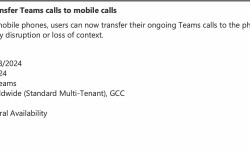What Teams the Premium Covers, Defined
Microsoft introduced Teams Premium on October 12, 2022. The company predicted that this add-on license would cost $10 per user per month. Organizations can test the sophisticated meeting and security capabilities that Microsoft thinks will make Teams Premium a popular option, especially among enterprise tenants, with 30-day test licenses. Microsoft underlines that Teams Premium covers areas for which a collection of add-ins from various software vendors would otherwise be required. Their strongest suit is the close interaction with basic Teams functions.
It's confusing that Microsoft is still selling the Teams Advanced Communications license, which may no longer be available once Teams Premium becomes widely accessible in February 2023. The prediction of that date should be treated with a significant amount of skepticism.
Additional Information Regarding Features Transferring to Teams Premium
Microsoft "to give further clarity" revised Microsoft 365 notification MC445406 (the initial announcement for Teams Premium) on January 14. Microsoft explicitly states that certain capabilities formerly included in the Teams standard license will be added to Teams Premium in this case.
Microsoft will provide each feature a grace period so that users with Teams basic licenses can gradually stop using it. Holders of Teams basic licenses won't have access to the premium features after the grace period has passed.
The following features are migrating to Teams Premium:
🟧 Captions are translated in real time while teams meet. Users can choose to view captions that are generated for voice exchanges during meetings in their favorite language using this feature. There are 60 days of grace.
🟧 custom scenes for united mode. When using the together mode in Teams meetings, a scene serves as the backdrop for the attendees. Standard users can pick from a selection of Microsoft-created scenes. Custom scenes made with the Teams scene studio can be used by those with premium licenses. For instance, you may design a unique setting based on a well-known real-world meeting location, like an atrium or conference room. The 30-day grace period is given. Owners of Teams standard licenses shouldn't be impacted by this change because using custom combined mode spaces previously required the Teams advanced communication license.
🟧 Timelines in the Team meetings' recordings. These cues show when attendees enter and exit a meeting. The 30-day grace period is given.
🟧 Similar to the Bookings tool for Outlook, virtual appointments let users book and manage organized appointments through online Teams sessions. The virtual appointments functionality is still accessible to basic users, but its premium capabilities, like SMS notifications to let people know when an appointment is planned, analytics in the Teams admin center, and the capacity to see queued appointments, demand the additional license.
The feature that makes topics discussed in meetings more accessible to users, live translation of captions, has the longest grace time of this group. Its new status can be seen as more sensitive as a result. This impression may have some basis in reality. Whoever would want to pay for Teams Premium depends on whether the option to use live caption translation or any of the other elements that were transferred were restored. I have my doubts, which raises the issue of why Microsoft made the decision to make these features premium.
The Issue of Licenses
The specific licensing requirements for each of the premium features are another issue that needs additional clarification. In some circumstances, such as when individual users want to select different languages for live captioning, it appears that per-user license is required. Others depend on individuals performing particular duties, such as those in charge of planning sophisticated webinars (Teams webinar events with features such as waiting lists). Microsoft has not yet made these specifics public.
The Premium Argument
Microsoft has every reason to provide Teams Premium licensing for particular features. Some businesses require features like the capacity to use meeting templates, sensitivity labeling, and the option to watermark meetings in order to secure meeting content.
In the same way, I don't mind if Microsoft requires premium licenses for new features. Moving features from the normal license to premium status does appear to be a slight alteration in the game's rules, though. I suppose there is increasing pressure to make as much money as possible from Microsoft 365 users.









